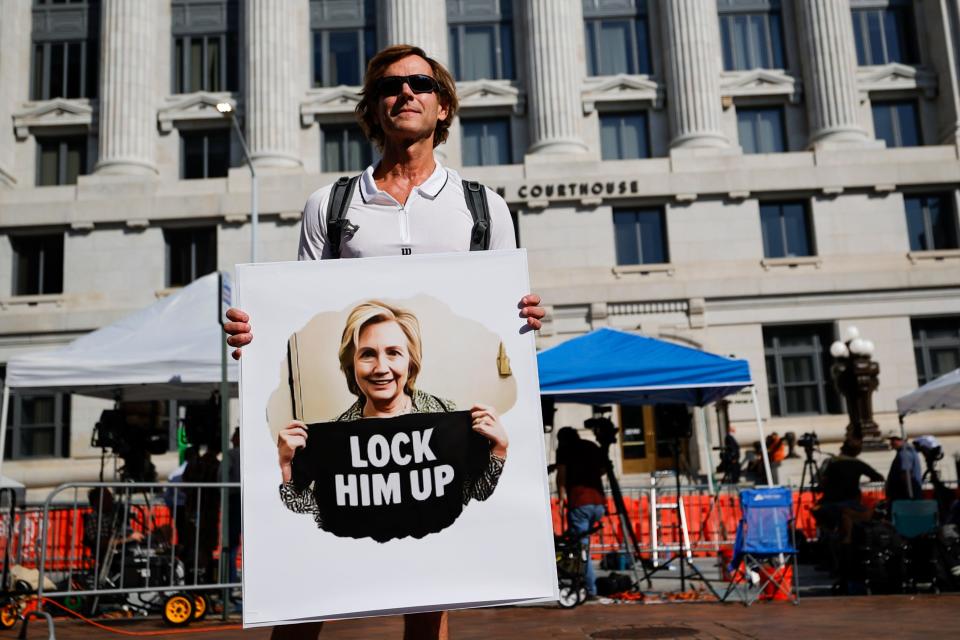Will Trump go to prison? Why jail time is unlikely for the former president.
- Oops!Something went wrong.Please try again later.
The fourth indictment of Donald Trump again raises the possibility that a former president of the United States will be sent to prison.
One of these cases, as some on the left seem to hope, must surely result in Trump being remanded to custody, sparking all of the embarrassment and rage that would come with his fall from the Oval Office to a cell block.
The Georgia indictment is a serious threat for Trump as is the federal court case in Florida. However, multiplying the indictments does not necessarily increase the changes of imprisonment before the election, or even during a possible second Trump term.
The sense of anticipation was captured Monday on MSNBC, where Rachel Maddow and Hillary Clinton were shown laughing joyfully on the night of the Georgia indictment. The left is experiencing its own version of chanting, "Lock him up," with a boom business for merchandise celebrating the expected incarceration.

Yet, there is still a great deal of runway between the arraignments and any incarceration. Let's quickly review the four cases against Trump:
►The New York indictment, led by Manhattan District Attorney Alvin Bragg, is the weakest. It is based on a thin legal theory pushed by a prosecutor determined to charge Trump for something − anything.
►The first federal indictment is the strongest of the four. The charges over the mishandling of classified documents are based on established law and firm evidence.
►The second federal indictment is similar to the Georgia case in terms of the underlying acts. Both the Georgia case and the federal indictment surrounding the riot at the U.S. Capitol on Jan. 6, 2021, are based on the view that Trump and his associates knew that there was no reasonable basis to challenge the 2020 election.
►However, Georgia adds state charges that could not only be difficult to challenge before trial but also are not subject to a federal pardon.
First Amendment: Indicting Trump for 'knowingly false statements' about election sets US on dangerous path
Trump faces 13 counts in Georgia indictment
The 98-page indictment contains 13 counts against Trump. The state charges include mandatory minimum sentences of five years in prison, with no leeway for the sentencing judge. Even five years in prison for a man who is 77 years old (and who never has been incarcerated) could be a terminal sentence.
Would the judicial system really send an elderly former president to prison for the rest of his life? For that reason alone, it seems unlikely that the left's hopeful visions of Trump fending for himself in a prison yard will ever be realized.
Key numbers in Trump trial: Why prosecutors will push for a speedy trial before 2024
It's important to remember that none of the charges against Trump, or even a conviction, will stop him from running for president or serving if elected.
A quick resolution of the Georgia case or the others is unlikely. Fulton County District Attorney Fani Willis' request to try Trump starting March 4 is unrealistic. There also likely will be motions to remove the case to federal court.
Given the competing criminal and civil proceedings previously scheduled around the country, the Georgia trial may have to wait until after next year's election. Even if it were held in the midst of the presidential vote, a conviction would not bar Trump from appearing on the ballot or taking the oath of office on Jan. 20, 2025.
Can Trump run for president from prison?
There is even precedent for running for the presidency from prison. That distinction belongs to socialist Eugene Debs, who was on the ballot in 1920 while he served time in federal prison.
If Trump is convicted, most courts would allow him to remain free pending appeals on the weighty constitutional and evidentiary issues raised by the Georgia case. That process could easily take a couple of years.
Republicans, ditch the Trump drama: Find a candidate not embroiled in criminal charges
And if Trump were to win in 2024 and a judge were to order his incarceration during his presidency, there would be an immediate challenge. While state offenses are not subject to the federal pardon authority, Trump's counsel (and likely the Justice Department) would argue that incarcerating a sitting president conflicts with carrying out his federal duties.
This challenge would take time, and the federal courts could balance the state and federal interests by delaying any incarceration until after the term. The courts also could effectively achieve that same result by extending the appellate process past the end of a second term.
Opinion alerts: Get columns from your favorite columnists + expert analysis on top issues, delivered straight to your device through the USA TODAY app. Don't have the app? Download it for free from your app store.
But let's assume that an incarceration order in the Georgia case is upheld during a second Trump presidency. If so, the state would have to yield to federal authority in how Trump is held to allow him to carry out his duties and to accommodate his security detail.
During this time, there may also be a move to change Georgia's pardon law. Under the state constitution, a five-member board (not the governor) grants pardons. Trump would have to wait five years to be eligible under the current provisions.
Georgia is only among a handful of states with such a system, and there could be a push to give the governor more traditional clemency power. However, that constitutional amendment process is very demanding, and Trump has hardly ingratiated himself with the current governor.

None of this is likely to quash the anticipation of Trump going to prison. Indeed, memes of a jailed Trump continue to be the rage online.
However, a review of the legal proceedings ahead is a buzzkill for the lock-him-up crowd. Despite the proliferation of charges against Trump, there is nothing that assures he will be sent to the big house instead of the White House.
Jonathan Turley, a member of USA TODAY's Board of Contributors, is the Shapiro professor of Public Interest Law at George Washington University. Follow him on Twitter @JonathanTurley
You can read diverse opinions from our Board of Contributors and other writers on the Opinion front page, on Twitter @usatodayopinion and in our daily Opinion newsletter. To respond to a column, submit a comment to letters@usatoday.com.
This article originally appeared on USA TODAY: Lock him up? Why it's unlikely Trump will be sent to prison

